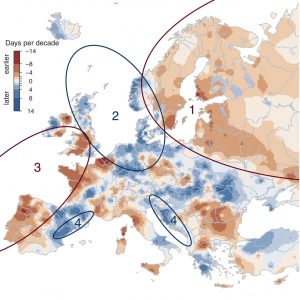Climate change delays North Sea flooding
by Sebastian Pitman
The impact of climate change on coastal flood events is of key concern to coastal managers at present. A new study has been published that investigates the link between climate change and the timing of flood events during the year.
The important message from the study is that the effects of a changing climate do not have a uniform impact across Europe, with some regions experiencing earlier flooding whereas such events are delayed elsewhere. Ultimately, climate change effects all manner of environmental parameters such as storminess, snow melt, and soil moisture content, all of which impact upon flood events.
In the North Sea region, the effect of climate change is to delay the onset of winter storms, which has resulted in a shift in flooding events on the order of 14 days later per decade (Figure 1).

Fig. 1 Observed trends of river flood timing in Europe, 1960–2010 (Blöschl et al., 2017).
When considering the impact later flood events will have on the North Sea region, the authors state that likely impacts could include softer ground for spring farming operations, higher soil compaction, enhanced erosion, and direct crop damage, thereby reducing agricultural productivity.
For a summary of predicted UK impacts on coastal flooding as a result of climate change, take a look at our recent post here.
